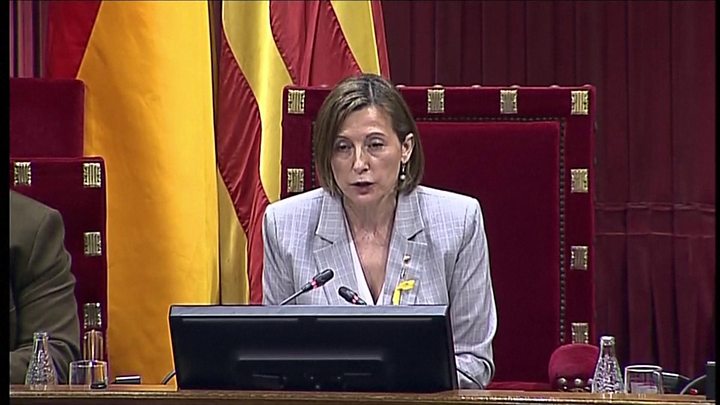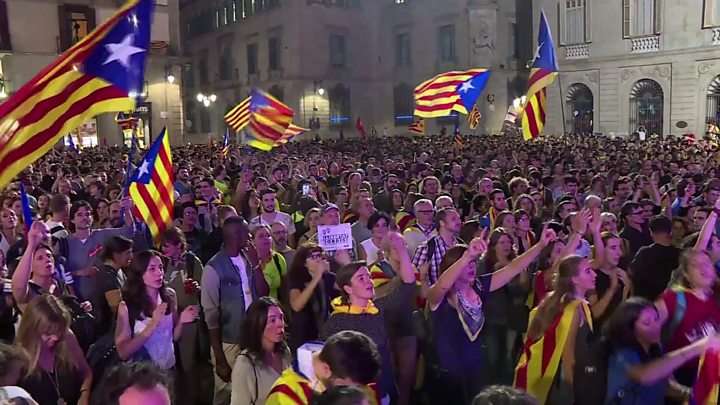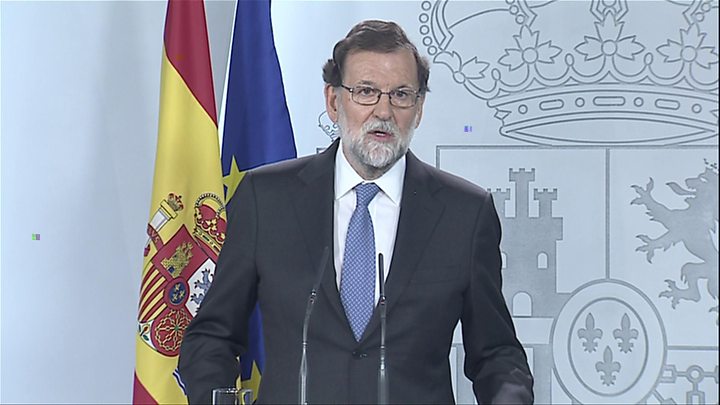Catalonia independence: Rajoy dissolves Catalan parliament
Spanish Prime Minister Mariano Rajoy is dissolving the Catalan parliament and calling snap local elections after MPs there voted to declare independence.
Mr Rajoy said the unprecedented imposition of direct rule on Catalonia was essential to "recover normality".
He is also firing Catalan leader Carles Puigdemont and his cabinet.
The crisis began when Catalan leaders held an independence referendum, defying a ruling by the Constitutional Court which had declared it illegal.
- Barca coach ducks Catalan crisis questions
- Catalonia crisis: What next for Spain?
- What powers does Catalonia have?
The Catalan government said that of the 43% of potential voters who took part, 90% were in favour of independence. Others boycotted the vote after the court ruling.
What did the Spanish PM say?
On Friday the Spanish Senate granted Mr Rajoy's government the power to impose direct rule on Catalonia, and after an emergency cabinet meeting Mr Rajoy spelled out what that would entail.
"The president [Carles Puigdemont] had the opportunity to return to legality and to call elections," he said.
"It is what the majority of the Catalonian people asked for – but he didn't want to do it. So the government of Spain is taking the necessary measures to return to legality."
Regional elections are scheduled for 21 December. Mr Rajoy also announced the sacking of the Catalan police chief.
Rajoy's dangerous move
By Sarah Rainsford, BBC News, Madrid
Spain's prime minister may have hoped warning Catalonia against declaring independence would be enough. Now he has to follow through on his pledge to impose direct rule, knowing this is highly risky.
Mariano Rajoy argues that Catalan separatists left him no choice. He had to act, to return the region to "legality", as Madrid puts it. But actually doing that will be complex and highly fraught.
It's why Mr Rajoy called for calm in Spain, after the Catalan vote for independence. He is acting with broad, cross-party support though, and public backing.
Here in Madrid many people have begun flying the Spanish national flag from their windows and balconies, to show their support for keeping the country united.
There is some sympathy for the Catalan cause, mostly because of the police crackdown during the referendum. But far louder are calls to prosecute those pushing for independence. It's a move which many Spaniards, like their government, are convinced was illegal.
What happened in the Catalan parliament?
A motion declaring independence was approved on Friday with 70 in favour, 10 against, and two abstentions in the 135-seat chamber. Several opposition MPs boycotted the vote.
 Media playback is unsupported on your device
Media playback is unsupported on your deviceMr Puigdemont has urged supporters to "maintain the momentum" in a peaceful manner.
Separatists say the move means they no longer fall under Spanish jurisdiction.
But the Spanish Constitutional Court is likely to declare it illegal, while the EU, the US, the UK, Germany and France all expressed support for Spanish unity.
- EU faces danger of "more cracks" appearing in bloc
- The case for and against independence
- Reality Check: Police violence in Catalonia
Meanwhile Spanish prosecutors say they will file charges of "rebellion" against Mr Puigdemont next week.
What's the reaction been?
Thousands celebrated the declaration of independence on the streets of Barcelona, Catalonia's regional capital.
As the outcome of the vote became clear, people popped open cava, the local sparkling wine.
 Media playback is unsupported on your device
Media playback is unsupported on your deviceThe same crowds that cheered each Yes vote from Catalan MPs were reportedly booing Mr Rajoy as he made his announcement.
There have been pro-unity demonstrations too, with protesters in Barcelona waving Spanish flags and denouncing Catalan independence.
How did we get here?
After the 1 October referendum, Mr Puigdemont signed a declaration of independence but delayed implementation to allow talks with the Spanish government.
He ignored warnings by the Madrid government to cancel the move, prompting Mr Rajoy to first announce his plans to remove Catalan leaders and impose direct rule.
Catalonia is one of Spain's richest, most distinctive regions with a high degree of autonomy.
But many Catalans feel they pay more to Madrid than they get back, and there are historical grievances, too, in particular Catalonia's treatment under the dictatorship of General Franco.
Catalans are divided on the question of independence – an opinion poll earlier this year said 41% were in favour and 49% were opposed to independence.
- Does Catalonia want to leave Spain?
Catalonia in numbers
16% of Spain's population live in Catalonia, and it produces:
25.6% of Spain's exports
19% of Spain's GDP
20.7% of foreign investment
Ministry of Economy, Industry and Competitiveness, Eurostat, Bank of Spain GettySource – bbc.com

